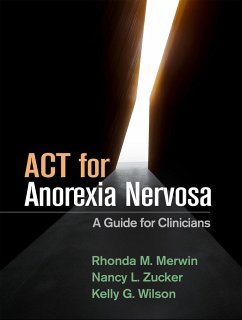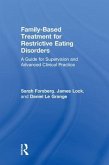- Gebundenes Buch
- Merkliste
- Auf die Merkliste
- Bewerten Bewerten
- Teilen
- Produkt teilen
- Produkterinnerung
- Produkterinnerung
This is the first book to present a roadmap for tailoring acceptance and commitment therapy (ACT) to the serious, complex challenges of anorexia nervosa (AN). Leading authorities describe interventions grounded in ACT core processes
Andere Kunden interessierten sich auch für
![Magersucht (Anorexia nervosa) infolge von Vaterentbehrung Magersucht (Anorexia nervosa) infolge von Vaterentbehrung]() Antje HeubelMagersucht (Anorexia nervosa) infolge von Vaterentbehrung29,99 €
Antje HeubelMagersucht (Anorexia nervosa) infolge von Vaterentbehrung29,99 €![Insights from a Sixty-Four-Year Case of Anorexia Nervosa Insights from a Sixty-Four-Year Case of Anorexia Nervosa]() Don R LipsittInsights from a Sixty-Four-Year Case of Anorexia Nervosa177,99 €
Don R LipsittInsights from a Sixty-Four-Year Case of Anorexia Nervosa177,99 €![Multifamily Therapy Group for Young Adults with Anorexia Nervosa Multifamily Therapy Group for Young Adults with Anorexia Nervosa]() Mary TantilloMultifamily Therapy Group for Young Adults with Anorexia Nervosa186,99 €
Mary TantilloMultifamily Therapy Group for Young Adults with Anorexia Nervosa186,99 €![Treating Bulimia in Adolescents Treating Bulimia in Adolescents]() Daniel Le GrangeTreating Bulimia in Adolescents68,99 €
Daniel Le GrangeTreating Bulimia in Adolescents68,99 €![All of Me All of Me]() Andrée DignonAll of Me56,95 €
Andrée DignonAll of Me56,95 €![Family Based Treatment for Restrictive Eating Disorders Family Based Treatment for Restrictive Eating Disorders]() Sarah ForsbergFamily Based Treatment for Restrictive Eating Disorders163,99 €
Sarah ForsbergFamily Based Treatment for Restrictive Eating Disorders163,99 €![Anorexia nervosa - Symptome, mögliche Ursachen und Behandlungsmöglichkeiten Anorexia nervosa - Symptome, mögliche Ursachen und Behandlungsmöglichkeiten]() Angelika HahlAnorexia nervosa - Symptome, mögliche Ursachen und Behandlungsmöglichkeiten17,95 €
Angelika HahlAnorexia nervosa - Symptome, mögliche Ursachen und Behandlungsmöglichkeiten17,95 €-
-
-
This is the first book to present a roadmap for tailoring acceptance and commitment therapy (ACT) to the serious, complex challenges of anorexia nervosa (AN). Leading authorities describe interventions grounded in ACT core processes
Hinweis: Dieser Artikel kann nur an eine deutsche Lieferadresse ausgeliefert werden.
Hinweis: Dieser Artikel kann nur an eine deutsche Lieferadresse ausgeliefert werden.
Produktdetails
- Produktdetails
- Verlag: Guilford Publications
- Seitenzahl: 286
- Erscheinungstermin: 9. Juli 2019
- Englisch
- Abmessung: 279mm x 211mm x 23mm
- Gewicht: 885g
- ISBN-13: 9781462540358
- ISBN-10: 146254035X
- Artikelnr.: 54914165
- Herstellerkennzeichnung
- Libri GmbH
- Europaallee 1
- 36244 Bad Hersfeld
- gpsr@libri.de
- Verlag: Guilford Publications
- Seitenzahl: 286
- Erscheinungstermin: 9. Juli 2019
- Englisch
- Abmessung: 279mm x 211mm x 23mm
- Gewicht: 885g
- ISBN-13: 9781462540358
- ISBN-10: 146254035X
- Artikelnr.: 54914165
- Herstellerkennzeichnung
- Libri GmbH
- Europaallee 1
- 36244 Bad Hersfeld
- gpsr@libri.de
Rhonda M. Merwin, PhD, is Associate Professor in the Department of Psychiatry and Behavioral Sciences at Duke University Medical Center. She is Director of the ACT at Duke Program, which conducts training, clinical services, and research in acceptance and commitment therapy (ACT), and is a core clinical, research, and teaching faculty member at the Duke University School of Medicine. Dr. Merwin's career has focused on using contextual behavioral science to understand and treat anorexia nervosa and maladaptive eating and weight control among individuals with type 1 diabetes. Dr. Merwin is recognized as an ACT trainer and has collaborated with the Duke Center for Eating Disorders since 2006. Nancy L. Zucker, PhD, is Associate Professor in the Department of Psychiatry and Behavioral Sciences at Duke University Medical Center. She is Director of the Duke Center for Eating Disorders and a core clinical, research, and teaching faculty member at the Duke University School of Medicine. Widely published, Dr. Zucker is an author of the American Psychiatric Association's revised practice guidelines for the treatment of eating disorders, currently under development. Dr. Zucker's clinical work and research focus on how to help young people develop a healthy awareness of their bodies' signals, and learn to match these signals to actions that allow them to flourish. Kelly G. Wilson, PhD, is Professor of Psychology at the University of Mississippi. He is a codeveloper of acceptance and commitment therapy (ACT). Dr. Wilson is coauthor of Acceptance and Commitment Therapy, Second Edition, and has published numerous other books, articles, chapters, treatment manuals, and technical reports. Dr. Wilson trains and consults internationally on the design and implementation of behavioral treatments. His work includes the investigation of acceptance, mindfulness, and values-oriented strategies in the treatment of a variety of problems in living, as well as in the basic behavioral science underlying therapeutic change.
Introduction: What is ACT?
1. The Phenomenology and Conceptualization of Anorexia Nervosa from an ACT
Perspective
2. Overview, Orienting Clients to Treatment, and Forming a Therapeutic
Alliance
3. ACT Case Formulation, Assessment, and Treatment Planning
4. Weight Restoration
5. Working with Parents, Partners, or Other Family Members of Individuals
with Anorexia Nervosa
6. Creating a Context for Change
7. Acceptance: Allowing Unwanted Internal Experiences
8. Helping Clients Author and Engage Personal Values
9. Defusing Language and Contacting the Present Moment
10. Sensing the Self
11. Treatment Progress and Termination and Final Thoughts for the Therapist
1. The Phenomenology and Conceptualization of Anorexia Nervosa from an ACT
Perspective
2. Overview, Orienting Clients to Treatment, and Forming a Therapeutic
Alliance
3. ACT Case Formulation, Assessment, and Treatment Planning
4. Weight Restoration
5. Working with Parents, Partners, or Other Family Members of Individuals
with Anorexia Nervosa
6. Creating a Context for Change
7. Acceptance: Allowing Unwanted Internal Experiences
8. Helping Clients Author and Engage Personal Values
9. Defusing Language and Contacting the Present Moment
10. Sensing the Self
11. Treatment Progress and Termination and Final Thoughts for the Therapist
Introduction: What is ACT?
1. The Phenomenology and Conceptualization of Anorexia Nervosa from an ACT
Perspective
2. Overview, Orienting Clients to Treatment, and Forming a Therapeutic
Alliance
3. ACT Case Formulation, Assessment, and Treatment Planning
4. Weight Restoration
5. Working with Parents, Partners, or Other Family Members of Individuals
with Anorexia Nervosa
6. Creating a Context for Change
7. Acceptance: Allowing Unwanted Internal Experiences
8. Helping Clients Author and Engage Personal Values
9. Defusing Language and Contacting the Present Moment
10. Sensing the Self
11. Treatment Progress and Termination and Final Thoughts for the Therapist
1. The Phenomenology and Conceptualization of Anorexia Nervosa from an ACT
Perspective
2. Overview, Orienting Clients to Treatment, and Forming a Therapeutic
Alliance
3. ACT Case Formulation, Assessment, and Treatment Planning
4. Weight Restoration
5. Working with Parents, Partners, or Other Family Members of Individuals
with Anorexia Nervosa
6. Creating a Context for Change
7. Acceptance: Allowing Unwanted Internal Experiences
8. Helping Clients Author and Engage Personal Values
9. Defusing Language and Contacting the Present Moment
10. Sensing the Self
11. Treatment Progress and Termination and Final Thoughts for the Therapist








